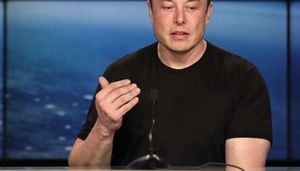The 2025 Bundestagswahl has yielded remarkable results, signaling significant shifts within the German political arena. According to initial projections by infratest dimap, the CDU has emerged as the clear winner nationwide, achieving 28.5% of the votes—a 4.4 percentage point increase compared to the last election. Following closely is the AfD, which garnered 20.5% of the votes, marking an extraordinary gain of 10 percentage points. Conversely, the SPD faced considerable decline, receiving only 16.4% of the votes—a drop of 9.3 percentage points.
Schleswig-Holstein reflects this nationwide trend, with the CDU leading at 27.6%. The SPD is firmly positioned as the second-largest party with 18.6%, followed by the AfD at 16.6% and the Greens at 14.8%. The Left party managed to secure 7.8% of the vote, whereas the FDP, SSW, and BSW failed to meet the 5% threshold, obtaining 4.7%, 3.9%, and 3.4% respectively.
The results come from nearly complete counts, with 2,889 out of 3,052 constituencies reported—around 95% of the total. CDU leader Daniel Günther commented, "Die Wählerinnen und Wähler in Deutschland haben ein eindeutiges Zeichen gesetzt: Sie haben die Ampel nach weniger als einer Wahlperiode abgewählt, wollen den Politikwechsel und eine Regierung, die endlich anpackt, Ankündigungen Taten folgen lässt und unser Land wieder nach vorne bringt" (The voters of Germany have sent a clear signal: they have dismissed the traffic light coalition after less than one term, wanting political change and a government ready to take action). This statement underlines the pressing call for new leadership as reflected by the electorate's choice.
The election results prompted swift reactions from party leaders, showcasing their strategic outlooks moving forward. Ralf Stegner from the SPD termed the results as "What a disaster for the SPD—3rd place behind right-wing extremists. The performance of the traffic light coalition was brutally punished." His comments reflect internal frustrations and the urgent need for introspection within the party following the electoral defeat.
Similarly, Serpil Midyatli of the SPD expressed her shock, noting, "I’m appalled by how many people gave their vote to the far-right AfD. We as the SPD can never come to terms with this.” These sentiments indicate enduring concerns about the rise of right-wing sentiments within Germany, something the left-wing parties are now grappling with.
Meanwhile, Kurt Kleinschmidt, the AfD candidate, expressed excitement about the results, exclaiming, "Das Ergebnis heute für Schleswig-Holstein ist der absolute Wahnsinn" (Today's results for Schleswig-Holstein are absolutely insane). He also emphasized the AfD's readiness for coalition negotiations, highlighting the need for CDU leader Friedrich Merz to respect the electorate's wishes.
On the opposite end, the FDP’s Wolfgang Kubicki reflected disappointment, stating, "We did not manage to regain confidence after the collapse of the traffic light coalition on November 6. It will be a long night." This indicates the pressures faced by smaller parties trying to recover lost ground.
The Greens, though experiencing some losses, expressed relief at salvaging their support, as noted by their candidate Robert Habeck, who said, "I am proud of what we have achieved, fighting our way up from the lows of under 10%." This perspective suggests resilience within the party structure, working to maintain their principles amid shifting political landscapes.
Luise Amtsberg, leading candidate for the Greens, expressed satisfaction with their performance, emphasizing their commitment to sticking to core issues like justice and climate protection, demonstrating the balancing act parties must undertake when catering to various voter bases.
Polling turnout for this election has also garnered attention, with 76.5% of eligible voters having cast their ballots by 5 PM, surpassing participation rates from previous national elections. This renewed engagement may indicate growing public interest and concern about political issues, countering apathy seen in earlier elections. The national turnout is projected to reach 84%, the highest since reunification, as per estimates from infratest dimap.
Importantly, the recent electoral reforms mean candidates must not only win most votes but also meet the new metrics calculated by their party’s second-vote tallies. Consequently, the Bundestag will be reduced to 630 members, streamlining representation and potentially enhancing party accountability.
Overall, the 2025 Bundestag elections reveal the shifting sentiments of the electorate, the emergence of new political dynamics, and the urgent need for parties to recalibrate their strategies. The results hold significant stakes for the national political future, influencing policy directions and coalition formations for the upcoming legislative term.



